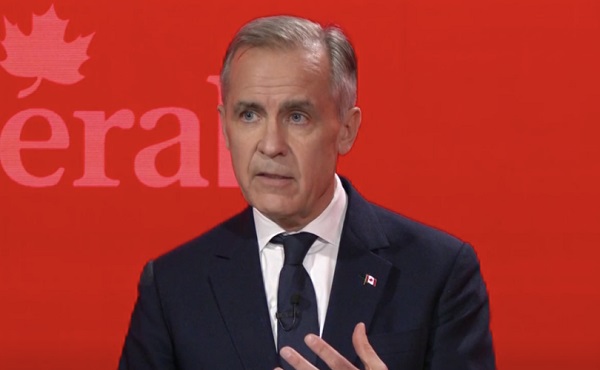Business
Liberal leadership debate sees candidates bash Trump, promise to fight ‘climate change’

From LifeSiteNews
Monday’s debate saw candidates Chrystia Freeland, Mark Carney and others accuse U.S. President Donald Trump of being the nation’s biggest threat while also restating their commitment to fighting ‘climate change.’
The first debate among Liberal leadership hopefuls Monday night saw the candidates focus heavily on bashing U.S. President Donald Trump, with all in the running also pledging their commitment to fighting “climate change.”
The French language debate, held in Montreal, saw frontrunner Mark Carney, former Finance Minister Chyrstia Freeland, and the two other lesser-known candidates, former House leader Karina Gould and former Liberal MP Frank Baylis, debate for two hours on a variety of topics, with Trump-bashing taking center stage. Freeland and Carney in particular, both of whom have ties to the globalist World Economic Forum, claimed Trump is the biggest threat Canada has faced in decades.
When asked about Trump’s ongoing threat to impose 25 percent tariffs on all Canadian goods at the start of March, Carney said, “Today’s Trump is very different from the Trump of the past,” asserting he is “more aggressive” than ever and that “he wants our country.”
Carney, who has a history of pushing the climate change narrative, was asked about his recent comments suggesting he would use emergency powers to combat Trump’s tariff threats by green-lighting energy projects in an attempt to make Canada less dependent on its neighbor to the south.
In response, Carney, whose proficiency in French seemed weaker than the others, appeared to hold back on committing to the building of pipelines from Alberta to Eastern Canada, but saying that such a project could be “possible.”
“70% of our oil comes from the U.S., our neighbor. No longer our friend, of course,” he added.
For Freeland’s part, she claimed that “Trump represents the greatest threat to Canada since World War II,” later boasting that she is the “only” one who could take on Trump via negotiation.
All the candidates said they “completely agree” that Trump is Canada’s largest “threat,” and all took turns bashing their biggest political rival, Conservative Party leader Pierre Poilievre, labeling him incompetent.
The leadership candidates also all agreed that “fighting” climate change was a priority but did not elaborate on what they would do differently than Prime Minister Justin Trudeau, whom they all praised for his “climate” leadership. Carney and Freeland, both of whom have long supported carbon taxes, vowed to eliminate the consumer carbon tax despite standing by it for years.
In addition to their ties to the WEF, both Freeland and Carney have a history of promoting or endorsing anti-life and anti-family agendas, including abortion and LGBT-related efforts.
Freeland is known by many as being the finance minister responsible for freezing the bank accounts of the 2022 Freedom Convoy participants and donors, actions Carney endorsed at the time.
Carney also recently admitted to being a “globalist” and an “elitist,” but defended the labels as positives.
The Liberal Party of Canada will choose its next leader, who will automatically become prime minister, on March 9, after Trudeau announced that he plans to step down as Liberal Party leader once a new leader has been chosen.
With respect to Trump, he has mentioned multiple times that he desires to annex Canada and turn it into a state.
Trump’s talk of taking over Canada by economic force comes at the same time he has threatened to impose massive tariffs on the nation.
Canada was given a 30-day reprieve from 25 percent tariffs by Trump at the end of January after Trudeau promised in a call to increase border security and crack down on fentanyl at the border. However, Trump has imposed a 25 percent tariff on steel and aluminum products.
Business
Trump family announces Trump Mobile: Made in America, for America

 MxM News
MxM News
Quick Hit:
On the 10-year anniversary of Donald Trump’s iconic campaign launch, the Trump family announced the debut of Trump Mobile, a new wireless company offering American-built smartphones, 5G coverage, and a values-driven alternative to Big Tech carriers.
Key Details:
-
Donald Trump Jr. and Eric Trump introduced Trump Mobile’s flagship service Monday, calling it a “transformational” alternative aimed at “our nation’s hardest-working people.”
-
The “47 Plan,” priced at $47.45/month, offers unlimited talk, text, and data, free international calls to U.S. military families, telehealth, roadside assistance, and no credit checks.
-
Trump Mobile’s customer support is fully U.S.-based and live 24/7—“not automated,” the company says—while a new American-made “T1 Phone” is slated for release in August.
Diving Deeper:
Marking ten years since President Donald Trump descended the golden escalator to launch his first campaign, the Trump Organization on Monday announced its boldest private sector move yet: Trump Mobile.
Flanked by company executives, Donald Trump Jr. and Eric Trump unveiled the new cellular service, touting it as a patriotic, people-first alternative to legacy providers. “We’re building on the movement to put America first,” Trump Jr. said in a statement. “We will deliver the highest levels of quality and service.”
The cornerstone of Trump Mobile is the 47 Plan. Offered for $47.45/month, the plan includes unlimited data, full 5G coverage across all three major carriers, and a suite of benefits tailored to middle-class families, truckers, veterans, and anyone tired of paying premiums to companies that don’t share their values.
Among the key perks: 24/7 American-based customer service (with “real people,” not bots), comprehensive device protection, roadside assistance through Drive America, and telehealth services including mental health support and prescription delivery. Most notably, the plan includes free international calling to over 100 countries—an effort the Trump family says honors U.S. military families stationed abroad.
“We’re especially proud to offer free long-distance calling to our military members and their families,” said Eric Trump. “Those serving overseas should always be able to stay connected to the people they love back home.”
Unlike traditional providers, Trump Mobile advertises no contracts and no credit checks, appealing to a demographic long underserved by mainstream telecom giants. “Hard-working Americans deserve a wireless service that’s affordable, reflects their values, and delivers reliable quality they can count on,” Eric Trump added.
The company is also preparing to launch the T1 Phone in August—a sleek, gold smartphone “engineered for performance” and “proudly designed and built in the United States.” With that, the Trump Organization is not just entering the mobile market—it’s staking a claim as a direct competitor to Apple and Samsung.
Business
Carney praises Trump’s world ‘leadership’ at G7 meeting in Canada

From LifeSiteNews
Canada’s prime minister said it was a ‘great honor’ to host the U.S. president and praised him for saying Canada wants to work with the U.S. ‘hand-in-hand.’
During the second day of the G7 leaders meeting in the Kananaskis area in Alberta, Canadian Prime Minister Mark Carney praised U.S. President Donald Trump’s world “leadership” despite saying many negative things about him during his election campaign.
While speaking to reporters Monday, Trump hinted that a new trade deal between Canada and the United States was potentially only “weeks” away. This came after a private meeting with Carney before the official G7 talks commenced.
“We’ve developed a very good relationship. And we’re going to be talking about trade and many other things,” Trump told reporters.
Carney was less vocal, however. He used the opportunity to tell reporters he was happy Trump came to his country for the G7 meeting, saying it was a “great honor” to host him.
“This marks the 50th birthday of the G7, and the G7 is nothing without U.S. leadership,” Carney told reporters.
He then spoke about Trump’s “personal leadership” on world issues and praised him for saying Canada wants to work with the U.S. “hand-in-hand.”
Carney ran his election campaign by claiming the Conservative Party would bow to Trump’s demands despite the fact that the party never said such things.
During his federal election campaign, Carney repeatedly took issue with Trump and the U.S. that turned into an anti-American Canadian legacy media frenzy.
However, the reality is, after Carney won the April 28 federal election, Trump praised him, saying, “Canada chose a very talented person.”
Many political pundits have said that Carney owes his win to Trump, as the U.S. president suggested on multiple occasions that he would rather work with Carney than conservative leader Pierre Poilievre.
Trump has routinely suggested that Canada become an American state in recent months, often making such statements while talking about or implementing trade tariffs on Canadian goods.
As for Carney, he has said his government plans to launch a “new economy” in Canada that will involve “deepening” ties to the world.
-

 Health20 hours ago
Health20 hours agoLast day and last chance to win this dream home! Support the 2025 Red Deer Hospital Lottery before midnight!
-

 Business2 days ago
Business2 days agoCarney’s European pivot could quietly reshape Canada’s sovereignty
-

 conflict1 day ago
conflict1 day ago“Evacuate”: Netanyahu Warns Tehran as Israel Expands Strikes on Iran’s Military Command
-

 Aristotle Foundation23 hours ago
Aristotle Foundation23 hours agoThe Canadian Medical Association’s inexplicable stance on pediatric gender medicine
-

 Alberta2 days ago
Alberta2 days agoAlberta’s grand bargain with Canada includes a new pipeline to Prince Rupert
-

 Energy1 day ago
Energy1 day agoCould the G7 Summit in Alberta be a historic moment for Canadian energy?
-

 Crime1 day ago
Crime1 day agoMinnesota shooter arrested after 48-hour manhunt
-

 Bruce Dowbiggin1 day ago
Bruce Dowbiggin1 day agoWOKE NBA Stars Seems Natural For CDN Advertisers. Why Won’t They Bite?





